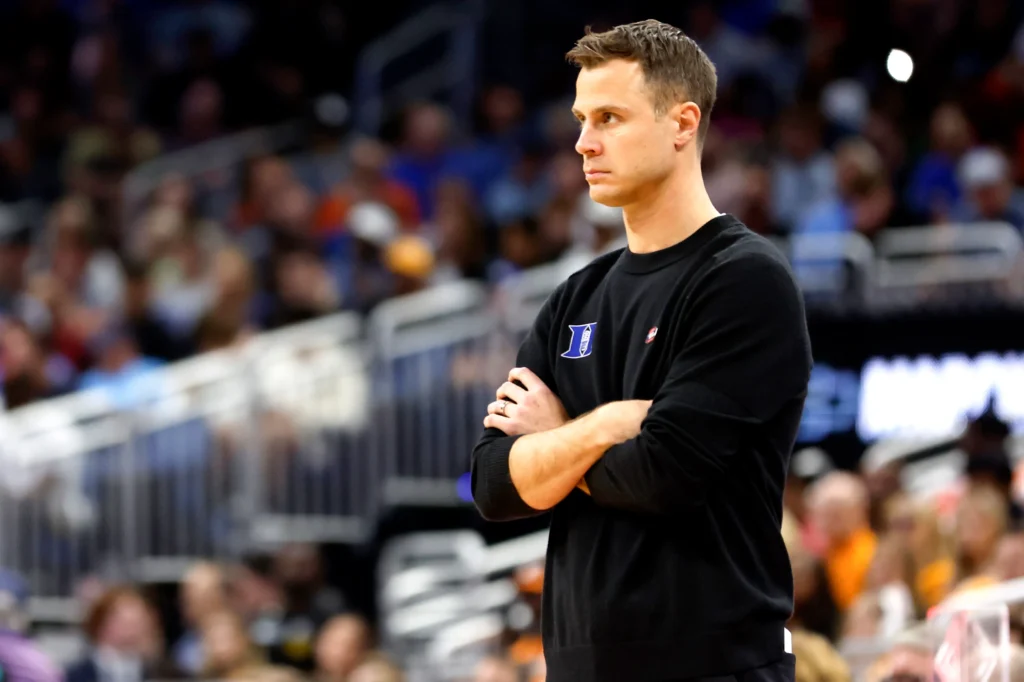
With the 27th overall pick in the 2025 NBA Draft, the Brooklyn Nets made a strategic selection by adding Danny Wolf, the 7-foot big man from the University of Michigan. For a team in the midst of reshaping its identity, culture, and future after the departure of stars and the onset of a full rebuild, selecting Wolf signaled a clear direction: the Nets are prioritizing smart, skilled, team-first players who can grow with their young core and elevate their system on both ends of the floor. Wolf may not have been one of the most hyped names heading into draft night, but his combination of size, shooting, passing, and basketball IQ makes him a fascinating addition to Brooklyn’s roster.
Danny Wolf had a productive and quietly dominant season at Michigan, where he transferred after two strong years at Yale. In his lone season with the Wolverines, he averaged 13.9 points, 8.8 rebounds, and 3.3 assists per game while shooting 37% from beyond the arc and 82% from the free throw line. His all-around offensive skill set made him one of the most versatile big men in the Big Ten. But it wasn’t just the numbers that attracted NBA scouts—it was the way he played. Wolf showed a rare blend of floor spacing, touch, and vision for a 7-footer. He became a hub in Michigan’s half-court offense, often operating from the high post or top of the key, initiating actions, and making quick, unselfish reads that kept the ball moving and the defense on its heels.
For the Nets, who lack a true playmaking big man and have been searching for offensive fluidity, Wolf offers a refreshing option. While not a traditional rim-runner or high-flying center, he brings an entirely different element to the floor—a cerebral, fundamentally sound style of play that encourages ball movement and spacing. Brooklyn’s offense, at times stagnant and reliant on isolation, will benefit from a center who can pass out of the post, hit cutters in stride, and knock down open threes when defenses collapse.
Wolf’s shooting ability is perhaps his most NBA-ready skill. With a clean, repeatable shooting stroke, he has range that extends beyond the three-point line. His ability to hit pick-and-pop jumpers and trail threes opens up the floor for Brooklyn’s guards, giving more room for slashers like Cam Thomas or Jalen Wilson to attack. In today’s NBA, where bigs who can shoot are no longer luxuries but necessities, Wolf checks a critical box. He doesn’t just stretch the floor; he forces defenses to honor him on the perimeter, which creates opportunities for others.
Defensively, Wolf is more of a positional defender than a shot-blocking menace. He isn’t the most explosive athlete, but he uses his length, timing, and awareness to contest shots, hold his ground in the post, and communicate effectively in help situations. He averaged just under 1.2 blocks per game at Michigan—not elite, but serviceable. His true strength on defense lies in his ability to anticipate plays and position himself correctly, which helps compensate for any lack of vertical pop. He’s not a switch-everything big, but he can hold his own in drop coverage and hedge-and-recover schemes. With continued strength development and NBA-level conditioning, his defensive ceiling is higher than many give him credit for.
Another advantage to Wolf’s game is his rebounding. He has a knack for positioning, boxing out, and tracking down loose balls. His 8.8 rebounds per game at Michigan were no accident. He’s relentless on the glass, particularly on the defensive end, where he often ends possessions with strong, two-handed boards. The Nets, who have struggled with rebounding consistency over recent seasons, will welcome his presence in the paint. His ability to secure rebounds and quickly initiate transition offense with outlet passes could be a game-changer for their tempo and spacing.
What sets Wolf apart from many big men in the draft is his high basketball IQ. He plays with patience, doesn’t force shots, and always seems to know where to be. His decision-making with the ball is among the best in the class for his position. Whether it’s a quick high-low feed, a skip pass to a corner shooter, or a handoff that flows into a pick-and-roll, Wolf’s feel for the game is advanced. Brooklyn’s front office has emphasized “smart basketball” in recent draft decisions, and Wolf perfectly fits that mold. He’ll be a coach’s dream in terms of running sets, executing assignments, and playing within a team concept.
From a personality and culture standpoint, Wolf is another win for Brooklyn. Known for his leadership and professionalism, he’s described by coaches as someone who sets the tone in practice and holds teammates accountable. He has a calm, confident demeanor that should translate well into the NBA. His Ivy League background at Yale speaks to his intelligence and discipline, while his successful stint at Michigan proved he could thrive at the highest levels of college competition. He brings no off-court drama, no ego—just a team-first mentality and a relentless work ethic.
The Nets are in a unique position organizationally. They aren’t quite bottoming out, but they’re not in a win-now phase either. It’s a bridge era, where young players are being evaluated and long-term building blocks are being identified. In this context, Wolf is the ideal type of player to add. He may not need heavy usage or guaranteed minutes immediately, but he can grow into a key contributor over time. As the Nets experiment with lineups, roles, and rotations, Wolf will quietly make his case through consistency and adaptability. By year two or three, it’s easy to imagine him becoming a trusted piece in the rotation, especially in lineups that emphasize ball movement and floor spacing.
In terms of long-term potential, Wolf has a high floor and a sneaky-high ceiling. While he may not become a superstar or even a nightly double-double machine, his unique skill set gives him a path to being a highly impactful role player—possibly even a starting center in the right system. Think along the lines of players like Kelly Olynyk or Al Horford in the later stages of their careers: smart, skilled bigs who can shoot, pass, and do the little things that win games. In the playoffs, those kinds of players become even more valuable, as teams hunt mismatches and rely on half-court execution.
Brooklyn fans may not have been screaming with excitement when Wolf’s name was called, but they might come to appreciate this pick as one of the savviest in the 2025 draft. In a class filled with boom-or-bust athletes and raw projects, Wolf brings stability, skill, and a clear identity. He knows what he is, and he plays to his strengths. That kind of self-awareness is rare in rookies and valuable in any locker room.
As the NBA season approaches, all eyes will be on training camp and preseason to see how Wolf adjusts to the speed, length, and intensity of the professional game. While it’s unlikely he starts from day one, he could carve out a backup center role early—especially if his shooting translates and his passing opens up bench units. Over time, with development and the right mentorship, he could become one of the better passing bigs in the league and a foundational piece in Brooklyn’s evolving frontcourt.
Danny Wolf’s story is just beginning, but the early chapters already show promise. From the Ivy League to the Big Ten and now to the NBA, he’s proved time and again that he belongs. Brooklyn saw that. They saw a player who won’t need to dominate the ball to make an impact, who will do the little things, play the right way, and grow into a critical piece of a team trying to build something lasting.
The 2025 NBA Draft may have had flashier picks and bolder trades, but the Nets’ selection of Danny Wolf might be remembered as one of the smarter, more forward-thinking moves of the night. Time will tell, but Brooklyn may have just found its next big man of the future—quiet, skilled, and exactly what they needed.





